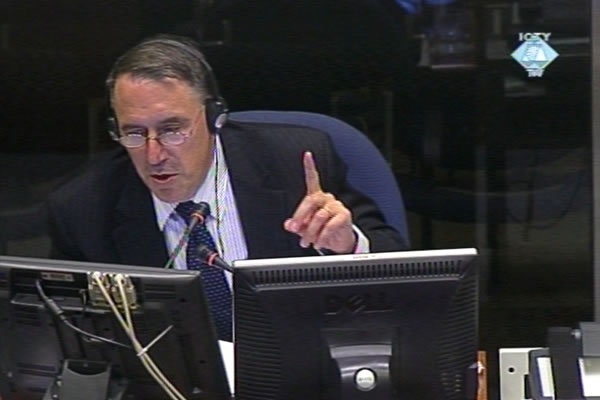Home
GALBRAITH: 'WE TWISTED TUDJMAN'S ARM'
Not contesting the fact that by 2000 some 40,000 Serbs who had fled after Operation Storm returned to Croatia, former US ambassador notes that it didn't happen because Tudjman wanted the Serbs back, but because of the American and European pressure. 'We twisted Tudjman's arm...', says Peter Galbraith
 Peter Galbraith, witness at the Gotovina, Cermak and Markac trialu
Peter Galbraith, witness at the Gotovina, Cermak and Markac trialu The defense teams of generals Ante Gotovina and Mladen Markac challenged in their cross-examination the claims made by Peter Galbraith, former US ambassador to Croatia. President Tudjman and his associates did everything they could to prevent Serbs who had fled Krajina after Operation Storm in August 1995 from returning to their homes, Galbraith said. According to defense teams, the situation was the exact opposite. Tudjman made efforts to ensure everyone could return, whilst taking into account the national security concerns.
According to Gotovina's defense counsel Greg Kehoe, the agreement on the normalization of relations between Croatia and the FRY signed in 1996 contradicts the witness's claims; in the agreement, both parties undertook the obligation to create conditions for the return of refugees. Ambassador Galbraith replied that the agreement was not a concession on Croatia’s part; it had to agree to it under US pressure.
The defense counsel went on to show a RSK document from January 1995, a list of 110,000 Serb conscripts, noting they too were among the refugees. That is why after Operation Storm Croatia had to run checks on those who had returned and not allow those who might pose a national security risk to return. The witness however pointed out that the list contained names of 41,000 men from Eastern Slavonia, adding he was sure the remaining 70,000 Krajina conscripts could not have been under arms. It is more likely, the witness said, that only 10 percent of that number was in the army ranks. In addition, the Croatian authorities prevented not only the men of military age from returning, but the women and the elderly too; one could not speak about any security checks.
Markac's defense counsel Tomislav Kuzmanovic in his cross-examination showed the witness a report drafted by the Croatian government indicating that some 40,000 refugees returned to Krajina by 2000. Galbraith didn't contest the number but said this didn't happen because Tudjman wanted Serbs to return but because America and Europe pressured Croatia to allow them to return. The US imposed sanctions on Croatia, the witness explained, cut down aid, threatened to put a stop to all military support and publicly called for the return of the Serbs. 'We twisted Tudjman's arm and he had to agree to the return of refugees', Galbraith said.
Markac's defense counsel finally put it to the witness that in the context of the crisis in the former Yugoslavia, Croatia was 'part of the solution and not part of the problem'. With a smile, Galbraith said that in 1991 Croatia was victim, then in 1993 it became part of the problem, then part of the solution, until August 1995 and Operation Storm when it again became a problem. When Tudjman died and new administration was inaugurated in 2000, Croatia once again became part of the solution, former US ambassador concluded.
Ivan Cermak's defense didn't have any questions for Galbraith. Tomorrow, he will be re-examined by the prosecution.
Linked Reports
- Case : Gotovina et al. - "Operation Storm"
- 2008-06-24 WHAT MADE TUDJMAN HAPPY
- 2008-06-23 GALBRAITH: AUTHORITIES ORDERED OR APPROVED CRIMES
- 2008-06-17 PROSECUTOR: CROATIA HAS NOT DELIVERED OPERATION STORM DOCUMENTS
- 2008-06-26 SARINIC: ‘REFUGEES MUST NOT RETURN’
- 2008-07-07 ‘DELIBERATE HARASSING FIRE’ ON KNIN
- 2008-07-08 WAS KRAJINA EXODUS SPONTANEOUS OR ORGANIZED?
